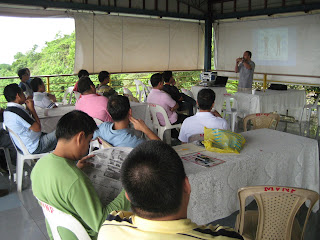
Here's the full transcript of the speech given by Regional Director Ma. Rosanna Urdaneta of Technical Education and Skills Development Authority during CITE's 4th Commencement Exercises for Industry Skills Training Program graduates on May 25, 2008.
Executive Director, Ruben Laraya, PESO Manager, Bonifacio Mercado Jr., graduates, guests, friends, ladies and gentlemen, good afternoon.
I feel privileged to be with you today to share in this exciitng occasion of your graduation.
This is a defining moment for all of you who now stand at the crossroads of your future. Whichever road you decide to take, the fate that awiats you at the end is a choice that is entirely yours to make.
If you care to look around you, you see a world full of people with great potentials, incredible skills, and unique talents. Yet sadly, many of these so called promising individuals have become a burden to their communities, their friends, and their families. Reputation and credentials alone by itself does not guarantee a bright future. You've gotta work!
And to prepare you to be in a position to compete for work in this competitive world is the business of this institution! I tell you, you couldn't be in a better place than to be here right now!
I think you know what I mean. Outside of the confines of this training center are a myriad of temptations that can cause you to slip and slide if you are not careful.
Your mentors, instructors, and this veritable institution have brought you to a position where you can make a name for yourself. They have taught you the skills, the discipline, and the ability to discern maturely which path to pursue.
WHat you will become in the future serves as a mirror to this institution, a gauge whether we have succeeded or failed in our mandate.
Maybe it has not yet sunk into your minds but I tell you, all of you are now vastly different from who and what you were when your first set foot in this premises. You have been transformed, empowered and given wings to fly by the virtue of the Industy Skills Training Program under the auspices and collaboration of CITE and TESDA.
You are a product of an educational system that smartly combines the theories learned from a classroom environment and the application of those learned theories by exposing each one of you to "actual and live" scenarios in the various industries who unselfishly extended their facilities as training ground.
The distinct advantage of this kind of educational system is that it allows students to experience work in a real setting. It gives a student a foretaste of the actual world so that when the time comes whent they are hired as "real" workers, they assimilate and adapt to the work environment much faster.
More than that, the actual experience, (with the guidance of the mentor or supervisor) allows the student to identify what areas he is strong and what areas he is weak in. Then the trainer supervisor prescribes remedial action to make him or her a more competent worker.
Your graduation today is a certification that each one of you is now equipped with an acceptable level of competence needed in your particular field of industry to produce an acceptable level of proficiency. The skills you have acquired are very powerful tools. They are in fact assets that can never be taken away from you! Yet those are transferable skills as well that you can pass on from one generation to another.
You are our new breed of ambassadors. Wherever you go you wear the "brand" of this institution and I am sure you will make us proud someday. Go then and fulfill your destiny and make your family and your country proud of you.
In closing, I would like to extend my deepest gratitude to those who in one way or another contributed to the success of this endeavor, your families and loved ones, for the individual support they have given you.
Kudos too to the officers, staff, and faculty members of CITE! May God bless you and continue to prosper the work of your hands!






